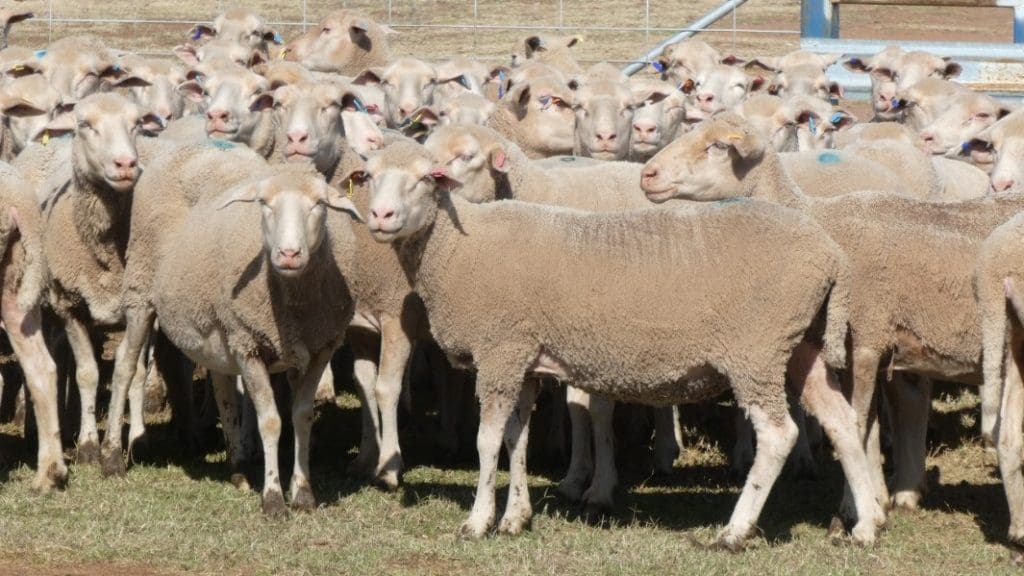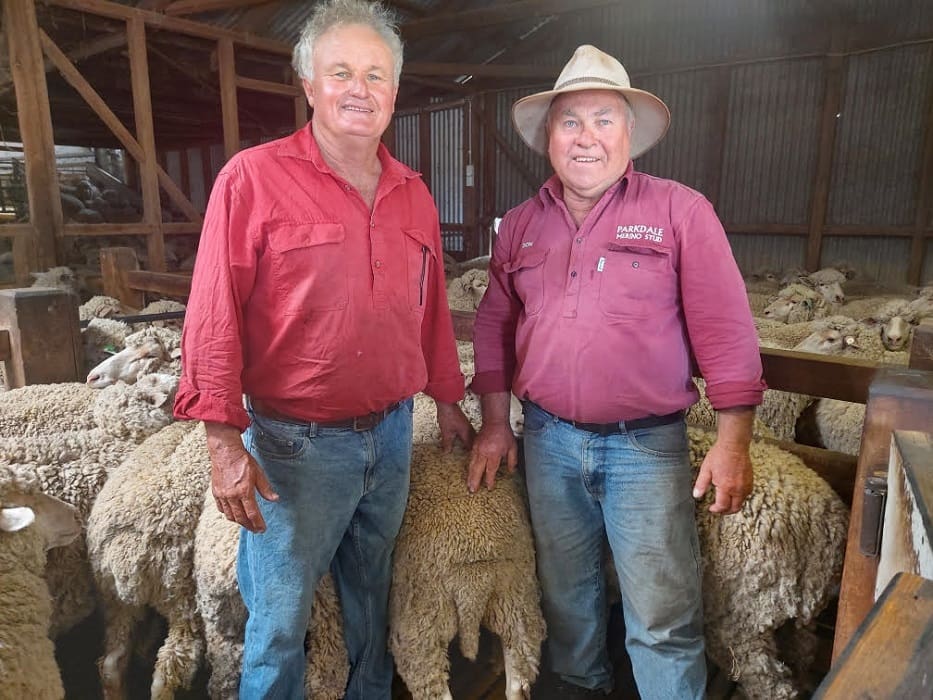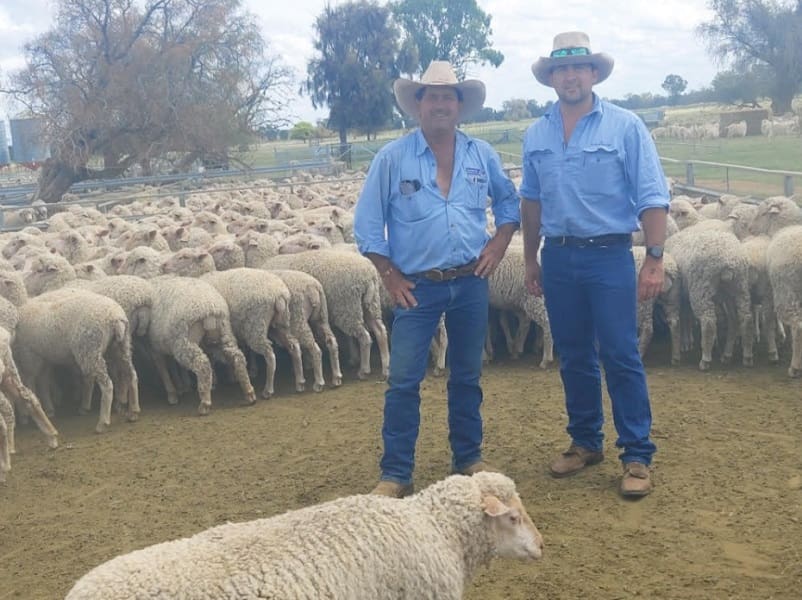
The short-tailed Parkdale Merino ewes sold last week. Image – AuctionsPlus.
TRANGIE wool grower Tim Burns has paid just $230 for the first public offering of short-tailed Merino ewes in Australia and he believes he got the deal of the day.
The 165 5, 6 and 7 year-old SRS-bred scanned empty ex-stud and commercial ewes were the first public offering of the short-tailed Finn-infused poll Merino ewes Parkdale SRS principal Don Mudford began developing with the late SRS founder and scientist Dr Jim Watts about 11 years ago.
They were among an offering of 3365 early January shorn Parkdale SRS Poll Merino ewes and 41 rams offered on the Dubbo property by agents Hartin Schute Bell and Nutrien Walsh Hughes on 17 February and interfaced on AuctionsPlus.
The short-tailed bare breech unmulesed ewes had tails measuring a quarter to half the usual Merino tail length, which meant mulesing, tail-docking and fly chemical treatments weren’t needed. They also produce a 19/20 micron fleece – about 5.5-6 kilograms of AAAM for 12 months growth – with bare legs and bellies, but the big attraction to Tim Burns was their fertility.
Courtesy of the high fecundity of their Finn heritage and Parkdale SRS selection, the ewes were advertised as consistently achieving pregnancy scans of 200 percent-plus and rearing 170pc-plus lambs per ewe joined.
“They came up, they were in my price range and they had good lambing percentages, so I thought I would try them,” Tim said.
“Now I’ve got them I’ve realised I’ve probably made a pretty good decision, after what everyone has told me … the workers at Parkdale said they will just lamb everywhere,” he said.
“That’s the way to go, it’s not always about wool; it’s about lambing percentages, that’s where you make your money.”

Purchaser of the short-tailed Parkdale ewes Tim Burns, left, with Parkdale SRS principal Don Mudford.
Tim said at the Parkdale field day last year, Lambs Alive consultant Dr Jason Trompf said the genetic fat and muscle in the Parkdale sheep would help them survive hard times. Parkdale sheep have been selected on SRS breeding principles and using Australian Sheep Breeding Values focussing on carcase, wool and reproduction traits.
“If you are getting good lambing percentages, you might have to cut 20kgs of wool just to make up the difference.”
Tim said even without calculating the likely returns of ewes weaning 170pc lambs versus singles, he believes he got “the deal of the day” at the sale.
“One of the other clients rang me up and said: ‘you got the buy of the day and he was asleep at the wheel’.”
Because of the ewes’ fertility, their low maintenance traits and Merino wool fleeces, Tim believes the purchase will be a “game changer” for his business.
“If they can do anywhere close to what they say they should do, it will be a game changer.
“Over time you will increase the wool cut, you want the perfect sheep that rears as many lambs as possible and cuts as much wool as possible – there is nothing too greedy about that,” he said.
He considers he will be “ahead of the game, because I won’t have to worry about flies,” but concedes people are not sure about the short-tailed sheep yet.
“Some of the ewes out there, they look like Dorpers – no bellies and a big V (of bare skin) around their backside where they would normally get flyblown, but they say they should cut as much wool as a Merino with all the wrinkles.”
Tim already runs some Parkdale Merinos and has joined his first short-tailed Parkdale ram. He also bought 77 7.5 year-old former Parkdale stud ewes for $180 at the Parkdale on-property sale on 17 February.
“Now with these short-tailers I will have jumped the gun.”
Mr Mudford said enquiry before the sale was strong from commercial breeders wanting to be set up for the industry deadline of 2025 of the phasing out of mulesing.
The sale of scanned empty ewes started with two lines of 385 1.5 year-old ewes making $320, the 570 2.5 year-olds sold for $325, 415 3.5 year-olds made $380, 330 4.5 year-olds sold for $330 and 315 6.5 year-olds made $180. Four lines of 200 unshorn 5-6 month unshorn ewe lambs made $255. The 41 rams offered sold to $2250 for an average of $1450.
Mr Mudford said an agent had been told him Merino ewes of similar description to the Parkdale sheep had sold recently at prices 20pc lower.
“They are definitely selling at a premium, people are definitely after the mules-free genetics.”
Mr Mudford said the stand-out sale was his short-tailed ewes, though he would have liked them to have made more money.
“They weren’t young sheep, but they have a lot of lambs and have the ability to look after them.”
“They’re great mothers and you get a lot more ewe lambs to select from, so you can cull your mob harder,” he said.
“We weren’t sure how they would be received by commercial breeders as this is the first time we have put any natural short tail merino ewes up for auction.
“A bidding war between locals pushed them to $230.”
Parkdale also sells about 25 short-tailed rams annually, including a few at the annual ram sale, and mainly to clients in South Australia and Victoria.

Schute Bell Narromine agent Jason Hartin, left, with the buyer of the six month-old non-mulesed Parkdale ewe lambs, Charlie Bloomfield from Canowindra.

At lamb marking, I score tail length in the rams on a 1 to 5 scale with reference to the hock; where 5 is past the hock, 4 is down to the hock etc. Currently we don’t keep any score 5 ram lambs. We get a few that score 3. We also record if the tail has been ‘bitten’ off by the ewe. In the 2019 drop, we had one with no tail. We will try to determine if it is a genetic feature.